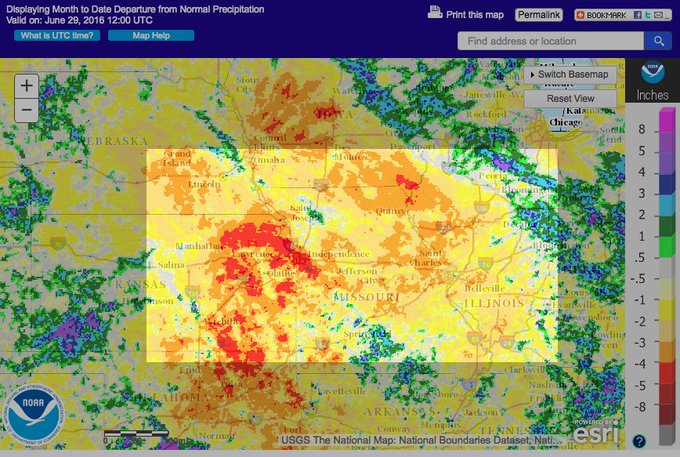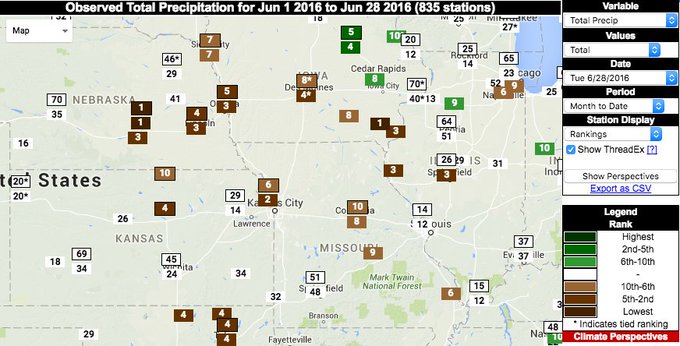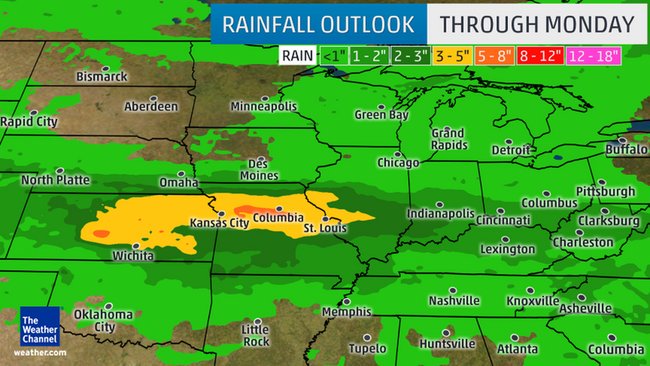Published: July 2,2016
The threat for heavy rain and flooding increases in parts of the Plains through the Fourth of July weekend, and the rain is expected to spread eastward and affect flood-ravaged West Virginia by Monday.
The National Weather Service has already hoisted flash flood watches in parts of the central Plains and mid-Mississippi Valley, including the Kansas City and St. Louis metro areas.

Current Flood Alerts
NOAA's Storm Prediction Center has issued a severe thunderstorm watch valid until 11:00 p.m. CDT for southern Kansas and northwestern Oklahoma. This includes Wichita, Kansas.

Current Radar with Watches and Warnings


Heavy Rainfall Setup
During the Fourth of July weekend, parts of Kansas, Missouri and southern Illinois are the main areas at risk for heavy rain and flash flooding, though some thunderstorm clusters may also affect parts of neighboring states, as well.
(MORE: Why Summer's Thunderstorm Clusters are Both Important and Dangerous
By Sunday and Sunday night, the flood threat begins to spread eastward into parts of the Ohio Valley.
By the Fourth of July, the flood threat, unfortunately, spreads into the mid-Atlantic and Appalachians, including West Virginia. This forecast will need to be monitored closely after last week's third-deadliest flood event in West Virginia's history.
(MORE: The Most Extreme Rainfall in All 50 States)

Rainfall Forecast
Interestingly, this part of the nation's heartland has been very dry in June. Some locations ended up with one of their top 10 driest Junes on record, according to the Southeast Regional Climate Center.
Grand Island, Nebraska, for instance, only picked up a June record low 0.05 inch of rain, during what is typically the second wettest month of the year. Only two other summer months, one during the Dust Bowl (July 1936), were drier, there.
Weekend heavy rain threat targeting a recently dry area. Several cities in top 10 driest Junes, per @SERCC.
(MORE: At Least 234 People Have Been Killed By Flooding in the U.S. in Nearly 18 Months)
If you plan on traveling along Interstate 70 between Denver and Kansas City or from St. Louis to Indianapolis, be mindful that flooding is a possibility along this major highway.
For travelers heading back home on Monday, Interstate 79 could potentially be impacted in West Virginia between Morgantown and Charleston. Interstate 64 may also see heavy rainfall Monday from Virginia into Kentucky.
According to FEMA:
- 6 inches of water will reach the bottom of most passenger cars, causing loss of control and potential stalling.
- 1 foot of water will float many vehicles.
- 2 feet of rushing water will carry away most vehicles, including SUVs and pickups.
(MORE: Your Vehicle Can Be a Deadly Trap in a Flash Flood





No comments:
Post a Comment